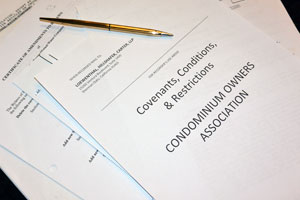By: David A. Loewenthal, Esq.
Robert D. Hillshafer, Esq.
By now, all Association board members should be fully aware that on January 1, 2012, Civil Code Section 1363.05, (commonly known as the Open Meeting Act), was amended in such a way that could dramatically change how many board’s operate. Specifically, the amendment largely eliminated what had historically been one of the ways that association’s board of directors met and conducted Association business: discussions and decisions via emails between directors.
Effective January 1, 2012, a Board of Directors ability to meet, conduct business and make decisions via email has been limited to “emergency situations.”
For those of us who have been involved in the homeowner association industry for a number of years, it is well understood that the purpose of the Open Meeting Act was and is to ensure that most board meetings and transactions, are to be conducted transparently in noticed meetings in front of the membership. Specifically, Civil Code Section 1363.05(b) states as follows: “Any member of the association may attend meetings of the board of directors of the Association, except when the board adjourns to executive session to consider litigation, matters relating to the formation of contracts with third parties, member discipline, personnel matters, or to meet with a member, upon the member’s request, regarding the member’s payment of assessments.” Thus, Board meetings and decision making were to be made in open, with the limited exception of those topics appropriately dealt with in an executive session.
That statute further requires the association provide at least four (4) days notice prior to any meeting, other than an emergency or executive session meeting. Commencing on January 1, 2012, even executive session meetings require two (2) days notice to the membership. In addition, the agendas for both a regular meeting and executive session meeting must be provided along with the notice of the meeting.
Despite the established statutory provisions governing how meetings were to be conducted and decisions made, many associations have discussed, conferred, and made decisions in a less formalistic way through the use of email. A typical example would be a non-emergency issue arising between the regular scheduled meetings, where a board member would transmit the issue to the other board members via email and a discussion would ensue. Generally agreements would be reached during these email discussions and action would be taken based upon those discussions. The benefit to the members of the Board was that it allowed for convenient and quick discussions on items without having to have a formal meeting which would require coordination of a date, time and location. However, the obvious issue with such a decision making process was that it excluded the membership from having notice that such a topic or issue was under consideration. As a result, the members ability to comment regarding the topic or issue, or receiving notice as to what the decision was that was made on that topic or issue would be forthcoming long after the fact.
The purpose of the amendment to the Open Meeting Act in 2012 was to explicitly ensure that transparency existed with respect to board discussion and decision making by dramatically limiting the ability to discuss and make decisions via the use of email, except for emergency situations.
Specifically, amended Section 1363.05(j)(1) states as follows:
“The board of directors shall not take action on any item of business outside of a meeting.
(2)(A) Notwithstanding Section 7211 of the Corporations Code, the board of directors shall not conduct a meeting via a series of electronic transmissions, including, but not limited to, electronic mail, except as specified in subparagraph (B).
(B) Electronic transmissions may be used as a method of conducting an emergency meeting if all members of the board, individually or collectively, consent in writing to that action, and if the written consent or consents are filed with the minutes of the meeting of the board. Written consent to conduct an emergency meeting may be transmitted electronically.
(K) As used in this section:
(1) “Item of Business” means any action within the authority of the board, except those actions that the board has validly delegated to any other person or persons, managing agent, officer of the association, or committee of the board comprising less than a majority of the board of directors.
(2) “Meeting” means either of the following:
(A) A congregation of a majority of the members of the board at the same time and place to hear, discuss or deliberate upon any item of business that is within the authority of the board.
(B) A teleconference in which a majority of the members of the board, in different locations, are connected by electronic means, through audio or video or both. A teleconference meeting shall be conducted in a manner that protects the rights of members of the Association and otherwise complies with the requirements of this title. Except for a meeting that will be held solely in executive session, the notice of the teleconference meeting shall identify at least one physical location so that members of the association may attend and at least one member of the board of directors shall be present at that location. Participation of board members in a teleconference meeting constitutes a presence at the meeting as long as all board members participating in the meeting are able to hear one another and members of the association speaking on matters before the board.”
The primary exception to the statutory limit on use of emails in this context is an emergency meeting. However, to prevent Board’s from characterizing everything as an emergency, Civil Code Section 1363.05(g) sets forth clear requirements in order to hold an emergency meeting. Specifically, this section states as follows: “An emergency meeting of the board may be called by the president of the association, or by any two members of the governing body other than the president, if there are circumstances that could not have been reasonably foreseen which require immediate attention and possible action by the board, and which of necessity makes it impracticable to provide notice as required by this section.”
Consequently, only an emergency meeting as defined under Section 1363.05(g) may be conducted electronically pursuant to Section 1363.05(j)(2)(B). Essential in determining whether or not a board can confer and make decisions via the use of email requires the following objective analysis:
- Is the circumstance actually an emergency? (Civil Code Section 1363.05(g)).
- Is the meeting being called by either the president or two other members of the board of directors? (Civil Code Section 1363.05(g)).
- Are the circumstances constituting the “emergency” such that it could not have been reasonably foreseen?
- Does the circumstance require immediate attention and possible action by the board and which, by necessity, make it impracticable to provide notice? (Civil Code Section 1363.05(g)).
- Did all of the members unanimously consent in writing to both the fact that the situation was an emergency and to hold the meeting electronically? (Civil Code Section 1363.05(j)(2)(B).
In order to be legitimately characterized as an emergency meeting, the above questions must each be answered in the affirmative to authorize an email board meeting and decision making.
It should be noted that emails between less than a majority of a board of directors may not violate of the language of the Open Meeting Act since a meeting cannot be conducted if there is less than a quorum present. However, Directors should avoid attempting to circumvent the intent of the email restrictions by manipulating this quorum requirement through an intentional “chain” of emails that are between directors less than a quorum. It is not worth the risk of having a business decision unwound because of an attempt to manipulate the statutory language.
However, there is no limitation in the statute concerning email transmission of information or documents by management or vendors to directors. Vendors and management can certainly email the board members with updates and other information without violating the Open Meeting Act since the Act pertains only to board meetings and decisions. Distribution of materials via email that will be on the agenda for discussion at the next open meeting is perfectly appropriate. Similarly, management recommendations to the Board concerning topics to be discussed at a meeting are also not inappropriate. However, the line is crossed if the management email solicits comments or feedback that constitutes a discussion amongst the board or solicits a decision which would trigger a potential violation of the Open Meeting Act unless the parameters for an “emergency” are met.
This “restrictive environment” associated with conducting Association business in transparent open meetings adds to the already significant burden placed on the volunteer director who has a busy life and schedule outside of doing the board’s business. A legitimate way for Board’s to mitigate these restrictions and resulting burdens is for Board’s to take advantage of its power of delegation in favor of executive committees or management, which are not subject to the same requirement of open meetings. Civil Code Section 1363.05(k)(1) authorizes the creation of executive committees to conduct certain items of Association business. Specifically, Association business is defined as “any action within the authority of the Board, except those actions that the Board has validly delegated to any other person(s), managing agent, officers of the Association or committee of the Board comprising less than a majority of directors.” The actions of properly authorized delegates are not subject to the requirements of the Open Meeting Act.
California Corporations Code Section 7212 allows a board of directors to create an executive committee if all of the following terms and conditions are met:
- That a majority of the board of directors votes to create an executive committee, provided that a quorum is present at the time of creation;
- Executive committee must consist of at least two (2) members of the board of directors, but less than a quorum;
- The executive committee exists at the discretion of the board for as long as the board so chooses;
- The executive committee will have the power of the board of directors, to the extent that the board has delegated such authority through their board resolution, except for those non-delegable duties as set forth under Corporations Code Section 7212(a)(1)-(8).
If certain duties are delegated, it is important that the parameters and limitations of such delegation are specifically identified so as to both protect the committee, officers or managing agent and to prevent abuse. Board’s should be very circumspect about how far they go in delegating when it is primarily for the sake of convenience, because the fact that duties and decision making have been delegated does not relieve the Board of its legal and fiduciary obligations and generally will not qualify for protection under the Business Judgment Rule.


